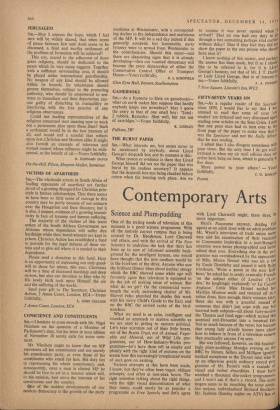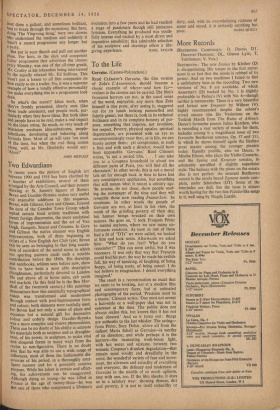Contemporary Arts
Science and Plum-pudding
ONE of the staring needs of television at this moment is a good science programme. With all the entirely correct rumpus that is being created by Dr. Henderson, Lord Cherwell and others, and with the arrival of The New Scientist to underline the lack that there has been up to now of informed scientific back- ground for the intelligent layman, one would have thought that the new medium would be in the forefront of the drive. Anyone who saw the brilliant Disney films about nuclear energy which the BBC showed some while ago will fervently agree that television is equipped to do the job of making sense of science. But what do we get? On the commercial wave- length the arch, patronising chatter of Mr. Marvel (who plumbed the depths this week with his merry Child's Guide to the Ear), and on the BBC the serried ranks of the bird- watchers.
What we need is as calm, intelligent and rounded an approach to matters scientific as we are used to getting to matters political. Let's take scientists out of their little boxes, out of the Brains Trust, out of Animal, Veget- able and Mineral, out of Wild Life pro- grammes, out of How-Industry-Works pro- grammes—let's have them tell us simply and plainly with the right kind of pictures on the screen bow this increasingly 'complicated world of ours goes on existing.
Various attempts at this have been made, I know, but they've often been vague, oblique attempts; and often at non-peak hours. The right scientists talking about the right things, with the right visual demonstration of what they mean, could surely be as popular a programme as Free Speech; and (let's agree
with Lord Cherwell) might, these days, be more important.
Here's Panorama anyway, dealing (Yet again) at an adult level with an adult problent, Mr. Wyatt's interviews of trade union ma' hers and his examination of their reactions to Communist leadership in a post-Hungell situation were better photographed and better edited than ever. Everything else in the pro' gramme was overshadowed by the appearance of Mlle. Minou Drouet who was set a test by Uncle Dimbleby and passed it with flyill tricolours, 'Write a poem in the next halt' hour,' he asked her in cosily avuncular French, 'on the subject either of Londres' ('Lon' don,' he laughingly explained) 'or La Cuisine Anglaise.' Little Miss Drouet smiled her Marilyn Monroe smile and teetered off in 3 velvet dress. Sure enough, thirty minutes later, there she was with a graceful morsel of nonsense that didn't just cope with one but married both subjects—all about fairy-stories. the Thames and fried eggs—which turned this sceptical anti-Drouetist into a besotted fan. Not so much because of the verse; but because that young lady already knows more about how to behave in front of a television camera than practically anyone I've seen. She was followed, however, on this fascinat' ingly plum-puddingy MondAy evening on the BBC by Messrs. Sellers and Milligan (genius; stacked exceptions to the Drouet rule) who lit up an otherwise greyly ordinary record pro' gramme of Mr. Payne's with a cascade 01 visual and verbal absurdities. I must have watched a thousand disc-jockey programmes' and I won't ask if that's a record. The same singers seem to be mouthing the same song, like serious, individualised Bernard Brothel's. Mr. Jackson (Sunday nights on ATV) has tit
least done a gallant, and sometimes brilliant, best to break through the monotony. But here, doing 'The Ying-tong Song,' were two clowns Who understand the medium and suddenly it Wasn't a record programme any longer but
a Party.
But put in your thumb and pull out another Plum. For here, in the slick and competent trailer programme that advertises the cinema every Monday, was one of the all-time greats, Mr. Crosby at his relaxedest being interviewed by the equally relaxed Mr. Ed Sullivan. This wasn't just a lesson to all film companies on how really to do a trailer. No, it was a supreme example of how a totally effective personality can make everything else in a programme look drab.
So what's the moral? Ideas work, when they're freshly presented, clearly seen (like those trade unionists), and people work, par- ticularly when they have ideaa. But both ideas and people have to be real, make a real impact on the inner retina. So much, so very much of television produces idea-substitutes, people- substitutes, developing and behaving along formula lines. Most of us will take 'em most of the time, but when the real thing comes along, well, as Mr. Dimbleby would say : Alors I
JOHN METCALF











































 Previous page
Previous page